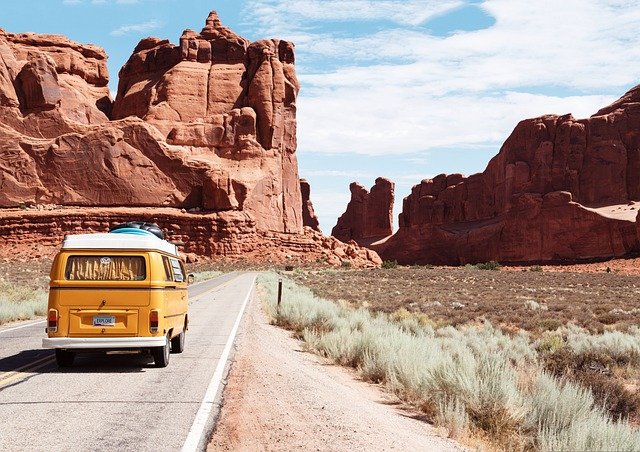Not quite like an RV, but better than a tent: Why conversion van camping may be the way to go.
Conversion van camping doesn’t give you the luxury of life in an RV, nor the discomfort of sleeping in a tent. It can be tough to safely heat a van at night, but it’s cheap compared to an RV, and you can go places they cannot. We spent more than 25 nights sleeping in our conversion van last year.
nor the discomfort of sleeping in a tent. It can be tough to safely heat a van at night, but it’s cheap compared to an RV, and you can go places they cannot. We spent more than 25 nights sleeping in our conversion van last year.
Life In A Conversion Van
Make your van into something that’s useable for you, especially if it’s going to be your residence for days or weeks at a time. For my wife and I, this meant having space to move around. We took out the two middle seats which, I convinced Ana, would be good armchairs for the living room. Then we had enough space for dressing or cooking. The bench-seat in back folds out into a comfortable bed, so we were all set for camping.
When traveling, you need a system of organization to keep your space inside the van livable. After our first long trip, we noticed the many things we never used. We got more efficient after that. We’re also able to keep the space open, despite carrying many things, by using plastic storage tubs you can buy almost anywhere. They stack well, and if you need more room at night, you can put them on the roof. They’re rainproof with the lids snapped on.
Heating A Conversion Van
Camping in a van can be cold at times, as it was for us in the deserts of Arizona last winter. We started the van and cranked up the heater once in a while, but only for brief periods. The danger of carbon monoxide poisoning is just too great to leave the car running while you are sleeping.
We also cooked to heat up the van. Our propane camp stove burned very clean. Any time it was cold, it was time to cook dinner, breakfast, or tea. This heated up the van nicely. Again, because of carbon monoxide, I wouldn’t recommend ever sleeping with a propane burner going. Still, sometimes a quick warm-up is all you need before you crawl under the blankets for the night.
The secret to heating a conversion van when camping is to give up. Enjoy meal time warm-ups, but unless you have electric power, I don’t know of a safe way to heat a van all night. Instead, you can heat yourselves. Wear warm clothing. Bring more blankets than you think you’ll need. Prepare a thermos bottle full of hot coffee each night, so it will be waitng for you in the morning. You get to warm the van when you make it, and warm up yourselves drinking it for breakfast.
Advantages Of Conversion Van Camping
Traveling and camping in a conversion van costs less than in an RV. The initial cost is a lot less if you buy used, as we did, and the cost of driving it is substantialy less. We averaged 18 miles per gallon on our last cross-country trip. Most recreational vehicles are lucky to get half of that, and they’re very expensive to maintain.
Compared with tent camping, a van is much more comfortable. Even if you backpack, you are probably going to drive some kind of car to wherever you go. With a van, you can come inside if it starts to rain. If you’re backpacking a long way from home, you can save on motels on the drive to and from the trailhead.
Camping can be more comfortable in an RV, but not in all ways. It’s nice, for example, to park anywhere. We’ve taken naps in parking lots, and nobody was the wiser, thanks to tinted windows, curtains, and the inconspicuousness of a van. At a free campground in Florida we got the best spot, on a bank overlooking Lake Talquin, because our van was small enough to fit there, unlike most of the RVs.
It’s great to be able to drive anywhere. In the conversion van, camping wherever we are when it gets dark is no problem. Finally, some larger RVs drag a car around because the big rig just isn’t practical for daily driving. Our coversion van is a second home AND our primary vehicle for shopping or going to work. That’s flexibilty.





